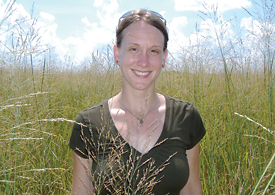Shelie Miller, who won a National Science Foundation award for her development of a switchgrass research tool, says biofuels won’t solve our energy or climate problems — but they can help.
“They are a source of domestic energy that can create jobs and stimulate rural economies,” says Miller, an assistant professor of natural resources and environment, School of Natural Resources and Environment (SNRE), with a joint appointment in civil and environmental engineering, CoE. She teaches environmental systems analysis at the graduate level and ecological issues to undergrads.

Photo by Josh Guillot.
These fuels also are fascinating to study because each poses its own particular upside and downside, she adds. “Bioenergy tends to be lower in greenhouse gas emissions than fossil fuels, but has impacts on water quality and takes up a lot of land. Switchgrass seems to be a type of biofuel where these tradeoffs are minimized.”
That’s because switchgrass is relatively low-maintenance when compared to crops like corn. It also can be grown where traditional crops don’t do very well, Miller says.
She traces her interest in the environment to her youth in suburban Cleveland. “I camped a lot as a kid. The idea you could do a job protecting nature was pretty neat to me. I pictured myself taking samples in a stream.”
What moment in the classroom or lab stands out as the most memorable?
I think the most memorable/fulfilling thing for me is whenever a student in my research group discovers a new concept or makes a major breakthrough.
What can’t you live without?
Getting outside and walking around at least once a day.
What is your favorite spot on campus?
The arch that runs under Dennison.
What inspires you?
The realization that my work is relevant to those outside my research circle. Whenever an acquaintance brings up a sustainability-related topic, I feel a renewed sense of urgency to help figure out some of society’s big picture issues.
What are you currently reading?
“Predictably Irrational” by Dan Ariely.
Who had the greatest influence on your career path?
My adviser, Tom Theis.
Initially, Miller thought she’d be an environmental chemist. “I realized there were some really big-picture sustainability problems. So I focused on life cycle analysis and sustainable systems research,” she says.
Her first tenure-track job was at Clemson University. “I moved to University of Michigan in 2010 because of all the terrific collaborative opportunities in sustainability research,” she says.
Her interests include advancing Life Cycle Assessment methods to analyze dynamic and emerging systems. These assessments inform a project she and some students are working on this summer, to explore the establishment of electric grids in Liberia.
“We’re trying to study what makes more sense — a centralized fossil fuels-run electric plant that transmits electricity across the country, or decentralized renewable power,” she says, such as small stream-powered turbines, regional bio energy sources or wind energy.
Miller and her students have met with Liberian government officials and stakeholders. “They are rebuilding after many years of civil war and coming up with a master plan for energy. We’re just hoping to help inform their decisions as they move forward,” she says.
“I find it rewarding to work with students and see how they develop as they become better researchers, as they start thinking more critically about problems and attacking problems at a deeper and more nuanced level.”
Outside of work, she enjoys practicing and skating with the Grand Prix Madonnas Detroit Derby Girls team during their season November through May, and playing in matches at Detroit Masonic Temple.
“It’s a weird mix of kitsch and sport,” she says. “There’s lots of great camaraderie. Plus, there’s no better way to blow off steam than executing a good, solid hit.”
The weekly Spotlight features faculty and staff members at the university. To nominate a candidate, please contact the Record staff at [email protected]

